'I heard from the Pakistani brigadier that Flying Officer Pradeep Apte had been killed after he ejected safely and tried to escape.
'This news sent a chill up my spine. I had been lucky so far...'
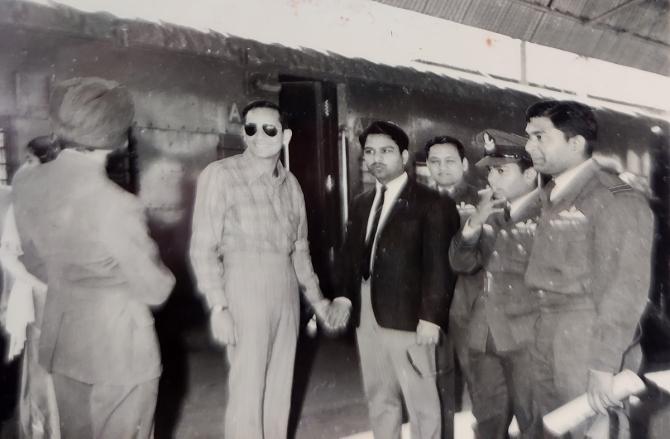
The 1971 war.
His first mission.
The last thing the young flying officer expected was to be shot down.
He ejected safely and followed the protocol for surviving in Pakistan.
'I am Flight Lieutenant Mansoor Ali of the Pakistan air force and I was shot down by the Indians near Bhitala village this morning,' he told the villagers who spotted him.
But the village school headmaster's suspicions were aroused. He called in the Pakistani Rangers and the young flying officer's hopes of making his way safely back to India were dashed.
It would be a long seven-day journey on camel back, jeep and a PAF propeller aircraft across Pakistani towns before he reached the POW camp in Rawalpindi.
As Air Commodore Jawahar Lal Bhargava concludes his gripping tale, Air Commodore Nitin Sathe (retired) listens in fascination.
- Part I: Captured in Pakistan
- Part II: 'I have been hit'
- Part III: 'You can kill me if you want'
- Part IV: 'I didn't want to be shot by my friends'
Flying officer Jawahar Lal Bhargava was now officially a Prisoner of War.
The next morning, the POW was handed over to a Captain Murtaza of the Pakistan army in the middle of the Thar desert.
"We were to spend the day at camp itself till Murtaza received orders from 'above'. He was a courteous man and allowed my handcuffs and blindfold to be removed.
"After issuing a stern warning, he also allowed me to roam around the little camp area. There was no food there; we survived on several cups of tea and cigarettes.
"His Jonga had five-star interiors. I realised how much power Pakistani armed forces officers wielded and got a glimpse of their lavish lifestyle."
In the evening, Bhargava Sir was loaded into the rear of a one-tonne truck and driven for about two hours until they reached Umerkot (in Sindh, Pakistan).
"It was bitingly cold and, despite the two blankets I was provided with, I was frozen to the bone at the end of the journey," recalls Bhargava Sir.
At Umerkot, he was taken to a bunker. A brigadier and some other senior officers spoke to him.
"You are now in safe hands and no harm will come to you!" the brigadier assured him.
Another senior officer casually asked, "Which part of India do you belong to?"
"Patiala, Punjab," answered the young pilot.
There was a surprised gasp from the officer, who responded with joy, "Patiala! I am from Patiala too. You must have heard of the famous cricket coach, Baba Ram Kishan. I used to train with him."
It was Bhargava's turn to be surprised. "What a coincidence, Sir! I too have trained under him and played for Punjab in the Ranji Trophy under his guidance!"
With this connection established, the Pakistani officers treated Bhargava Sir fairly well that night and during the travel that followed.
"I slept at the dak bungalow on a Dunlop mattress which gave some relief to my sore back! The next day, Captain Murtaza lent me his shaving razor and soap so that I could look 'officer-like' again!" grins Bhargava Sir.
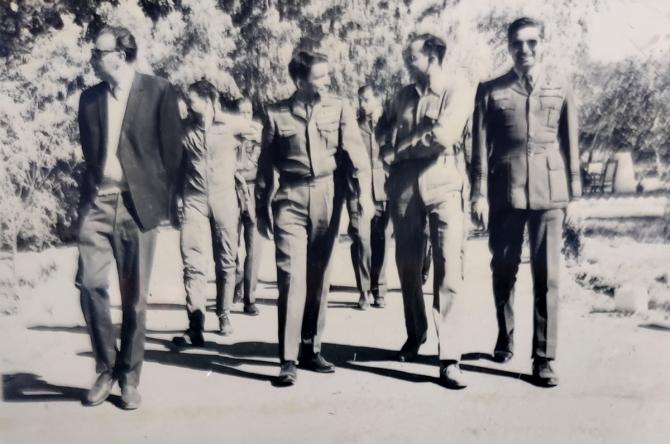
The prisoner was handed over to another agency who took him, blindfolded once again, on his onward journey to Naya Chor (also in Sindh, Pakistan).
"We were travelling in an open jeep. I realised I was in a battle zone as I heard ack-ack firing and the sound of fighter aircraft and artillery shelling."
Once they reached their destination, he was taken inside a bunker and his blindfold was removed.
A young-looking brigadier introduced himself and questioned Bhargava over a cup of tea.
"I told him that I had severe back pain and needed medical help as soon as possible."
The brigadier obliged and, soon, a Bengali doctor in Pakistani army uniform came to examine Bhargava Sir.
"All is well with you," he said, after examining his back. He prescribed some painkillers for the next leg of the journey.
"I heard from the brigadier that Flying Officer Pradeep Apte had been killed after he ejected safely and tried to escape.
"This news sent a chill up my spine. I had been lucky so far..." (It is believed that Apte was mercilessly killed as he was descending on his parachute.)
The meeting with the doctor, albeit a short one, would be fruitful than Bhargava Sir had then expected.
Soon this man would defect to India and, on his way to Bangladesh, bump into Bhargava Sir's brother at Jodhpur.
"He gave my brother an update on my condition. I came to know all this much later from my brother after we were allowed to receive letters from home in prison."
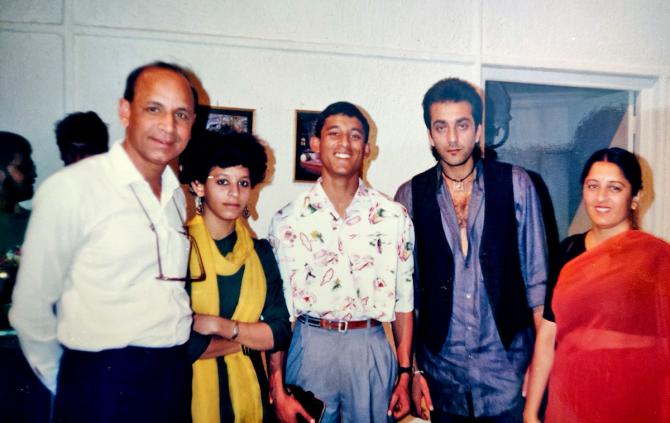
Finally, after much travel through the innards of Pakistan, Bhargava was handed over to the Pakistan air force authorities at Badin (Sindh).
From Badin, it was onwards to Drigh Road (Karachi), where formal interrogation was conducted.
"I was pleasantly surprised that there was no third-degree punishment meted out to me or to any of us during this phase. A senior group captain in overalls interrogated me under bright lights, just like you see in war movies!
"The first morning after breakfast, a barber waited in the veranda opposite my cell.
"A corporal soon came by and opened the cell next door. To my utter surprise, I saw Mulla Feroze coming out of his cell for a haircut! (Mulla Feroze was the forward air controller, giving out the latest information on the forward line of out troops when Bhargava Sir flew out on his two aircraft strike mission into the Naya Chor area with his commander, Squadron Leader K K 'Joe' Bakshi).
"He was sitting under the bright sky on the lawn and enjoying himself. He suggested I could also get my hair cut; it would give me an excuse to get out into the open.
"I agreed and it's a decision I regret till date," Bhargava Sir laughs. "They shaved my head clean and my hair never grew back properly again!"
On December 12, with the interrogation over, it was time for the final move to the POW camp at Rawalpindi.
The three IAF officers -- Flight Lieutenants Jawahar Lal Bhargava, Mulla Feroze and Squadron Leader 'Kamy' Kamat -- were bundled into a truck with their hands tied and eyes covered. The handcuffs, this time, were real.
"Very soon we reached an airfield and were bundled into a piston engine aircraft.
"We flew for a while and landed for fuel enroute at a small aerodrome before getting airborne for Chaklala (Rawalpindi). It was probably December 12 and the war was almost over."
Bhargava stayed in the POW camp at Rawalpindi for a year and was released in December 1972.
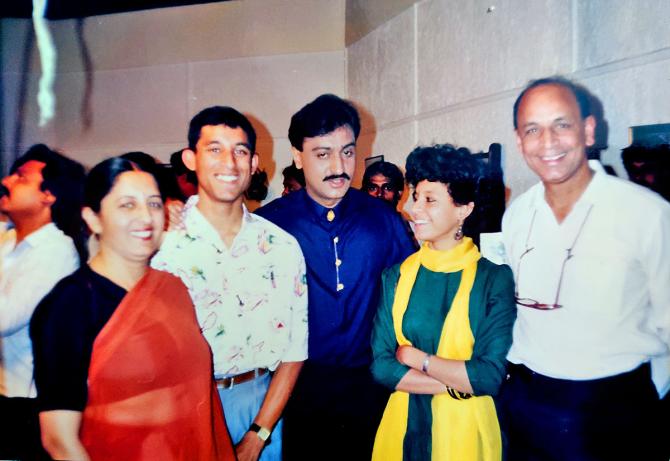
From Karachi to Rawalpindi
Bhargava Sir continues the story in his own words:
"It was almost night when I reached the local P&S unit that the PAF police had converted into a POW camp. They had modified a room into a cell.
:I was visited by a Corporal Ayub soon after I had been brought to this room. He made me feel at ease and said there were some more Indian pilots there whom I would meet soon. Of course, he did not tell me how many of us were there.
"This is where my solitary confinement, in the real sense of the word, began; I was all by myself in this dingy room.
"Except for a jute cot, a thin mattress covered with a white bedsheet, a thin pillow, a blanket and a small wattage bulb -- it was positioned in the ceiling above my head and remained switched on all night -- there was nothing else.
"I could not sleep properly due to the severe cold."
"I did not know then that we were all kept there in individual cells and that this place was in the middle of Rawalpindi.
"There was no one to talk to and my first night there was certainly not a good experience.
"At that time, I did not know I would have to get used to this kind of loneliness.
"The room had two doors. The inner door had a small hole at eye level so that the guards could see what I was up to.m I was not able to see outside since the outer door did not have any eyehole.
"Dinner, comprising a few chapattis and dal, was served in an enamel plate. I was given water in an enamel mug.
"Thanks to my jacket, which I had not removed after discarding my G-suit on the day I had ejected, I was not shivering. The cold, otherwise, would have been unbearable.
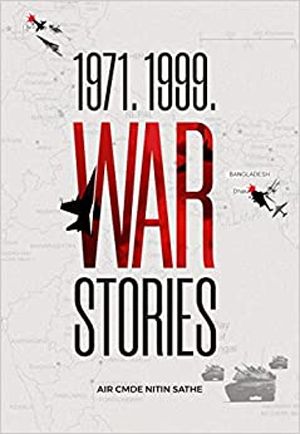
"That first night somehow passed. Soon, I began feeling the ill-effects of this kind of solitary life. As an extrovert, I did not like it at all. But did I have any control? As expected, I found it difficult to sleep at night.
"Going to the toilet was an experience by itself. You knocked at the door and, after the guard peeped through the eyehole, you told you asked him that you wanted to use to the toilet.
"'Wait for some time', came the reply on almost all occasions. Again, you had no choice. You were at his mercy.
"If you needed to visit the toilet multiple times during the cold night, God help you."
Air Commodore Nitin Sathe retired from the Indian Air Force in February 2020 after a distinguished 35 year career.
His latest book War Stories. 1971. 1999 has been published by Vitasta Publishing.
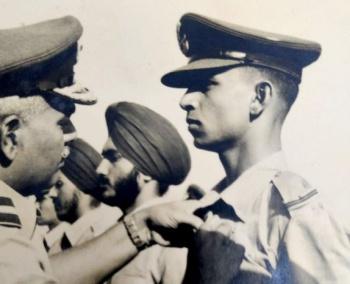
Feature Presentation: Rajesh Alva/Rediff.com

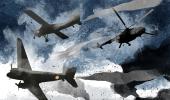









 © 2025
© 2025